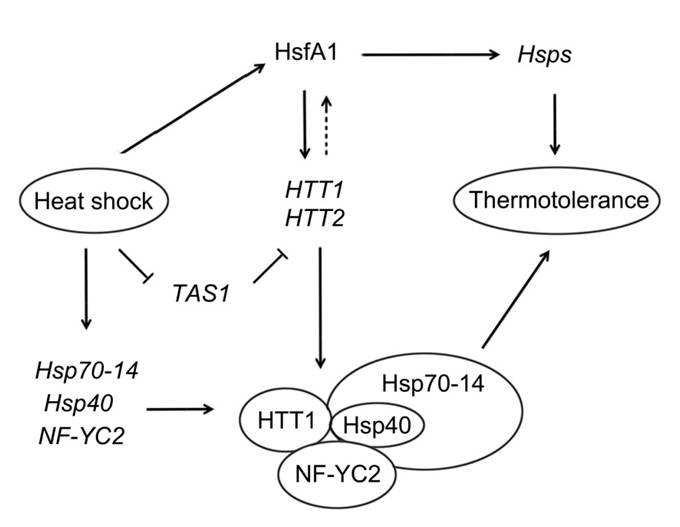Analysis of ta-siRNA-targeted Genes Reveals a Novel Molecular Mechanisms of Plant Thermotolerance
Heat stress causes extensive losses in agricultural production worldwide. Plants subjected to heat stress have evolved a variety of mechanisms to respond to high temperatures that minimize damage and ensure protection of cellular homeostasis. Central to the heat stress response in plants are the heat stress transcription factors (Hsfs) and heat stress proteins (Hsps). However, our understanding of the underlying molecular mechanisms of thermotolerance is limited. Recently, researchers from Chinese Academy of Sciences reported that HTT1 mediates plant thermotolerance.
Researchers led by Dr. HE Yuke in Institute of Plant Physiology and Ecology, Shanghai Institutes for Biological Sciences identified a role of unknown protein HTT1 in thermotolerance. Overexpression of TAS1a, whose trans-acting small interfering RNAs target the HTT genes, elevated accumulation of TAS1-siRNAs and reduced expression levels of the HTT genes, causing weaker thermotolerance. By contrast, overexpression of HTT1 upregulated several Hsf genes, and lead to stronger thermotolerance. Meanwhile, HsfA1a directly activated HTT genes through binding to their promoters. Further analysis revealed that HTT1 interacted with Hsp70-14, Hsp40, and NUCLEAR FACTOR Y, SUBUNIT C2, acting as cofactor of Hsp70-14 complexes. This research brings a new insight into understanding the mechanism of the plant heat stress response network.
This work entitled “HEAT-INDUCED TAS1 TARGET1 Mediates Thermotolerance via HEAT STRESS TRANSCRIPTION FACTOR A1a–Directed Pathways in Arabidopsis” was published in The Plant Cell on April, 2014. This research was supported by National Basic Research Program of China (Grant 2012CB113903).

Schematic Model of the Function of HTT Genes in Thermotolerance (Image by Dr. HE Yuke's group)
